
This post is about 5 reasons you need a business analyst on your project. We will delve into the skills and responsibilities of business analysts in comparison to those of project managers. Through this, you’ll gain a better understanding of project management and the impact of analytics. If you require further information, don’t hesitate to contact our experts. They will help you discover the optimal business solution for your needs.
Reading time: 17 min.
The IntexSoft is here to underscore the 5 reasons why you need a business analyst on your project. We also offer an enticing outsourcing proposition to assist you in selecting the right business analyst. This professional will not just manage your project, but will also steer it towards a successful conclusion. The result? Utter satisfaction of all stakeholders as every project requirement is fulfilled.
As you delve into this article, you will gain profound insights into the pivotal importance of business analysts, empowering owners and managers with extra expertise.
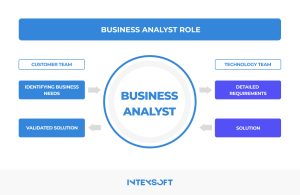
IIBA (The International Institute of Business Analysis), a non-profit organization that fosters excellence in the profession, views successful business analysts as dynamic catalysts for change—adaptable and invaluable.
They are the driving force to the project team behind propelling businesses toward process enhancement, product refinement, service optimization, and software advancement.
Are you seeking to refine your project’s goals and transform your business opportunities into achievements? If that is the case, business analysis professionals are your perfect partners. You might wonder why. It’s because they have the expertise to delve into data, intricate processes, and complex systems to turn your vision for a successful project into a reality.
Their primary responsibility is to define project requirements and identify potential solutions. As intermediaries between stakeholders and the production teams, they excel in this role like no other.
Succeeding in business analysis requires a unique set of qualifications and sales skills that distinguish professionals in this field. Let’s explore what makes them stand out:
The process of business analytics encompasses a variety of tasks at different stages of the development journey. To better understand these variations, let’s learn from the table below:
Business analyst role in a project at different stages. Goals for business analyst
| Phase | Responsibilities | Primary goal | Deliverable |
| Elaboration | – Collaborating with a solution architect and a UX researcher. – Unearthing business intricacies. – Defining the project’s anticipated business value. – Crafting comprehensive nonfunctional and functional requirements. – Expertly shaping the project backlog. |
Establishing a solid foundation for the project deeply grounded in business needs. | Documented business requirements. |
| Solution design | – Assessment of the project’s scope focusing on its business value. – Story mapping. – Forging crystal-clear acceptance criteria. – Prioritization of backlog items. |
A business analyst reviews and manages the user stories and acceptance criteria. | Documented and intricately structured backlog. |
| Development | – Ensuring the development activities stay firmly focused on business values and requirements. | Actively participating in pre-planning and grooming, monitoring development progress through the daily Scrum and Standup meetings. | A fully realized, meticulously crafted, and gracefully released business software product. |
| Maintenance | – Thoroughly gathering and processing customer feedback and user reaction. – Collecting data for advising business operations. – Uncovering hidden gems of opportunity for continuous improvement. |
A business analyst makes a new to-do list based on feedback on improving, changing, completing, and addressing business issues. | A software product that is maintained with resilience, improved, and continually evolving. |
When you write job descriptions for a business analyst or contact an outsourcing company with the goal of hiring, consider the qualifications and responsibilities mentioned earlier. You must have a deep understanding: Does your project lifecycle require a senior business analyst to assist in documenting business processes, or is a less established specialist enough? See the whole thing objectively.
In this context, apart from considering the project’s scope, timing, and complexity, the development methodology takes a prominent role.
If you opt for the Waterfall approach, it implies that development can’t commence until the business analyst has gathered and documented all the requirements. Furthermore, it’s essential to ensure that no alterations are necessary because Waterfall follows a strict, step-by-step process involving all team members. The business analyst must refine the requirements meticulously, as they are not amenable to changes.
Conversely, if you follow the Agile methodology, the business analyst can modify the requirements as needed, and developers will adjust the code and technical solution accordingly.
Under the Waterfall approach, a business analyst has no wiggle room. Therefore, it’s crucial to select highly experienced business analysts who have traversed several career paths before.
Project management business analysis and project management have many grade crossings. A senior project manager is more likely to excel in business analyst roles if they possess not only leadership skills but also well-developed analytical skills.
Effective project managers are responsible for a more extensive scope of project control and manage more significant tasks. To understand what this entails, refer to the images below.
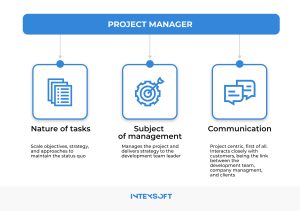
In the facilitator role the project manager must:
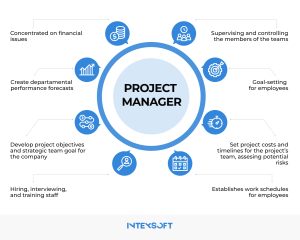
As a result, the skills required from a project manager are based on leadership abilities and all traits connected with project planning and advise management. Negotiation skills will be equally helpful in communication with stakeholders and in creating a favorable work environment. We can’t imagine a project manager without excellent organization skills, which are essential in project plan development. Helping team members stay informed about current matters is also a priority throughout the project manager job.
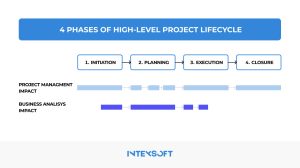
Discover these strategies to enhance collaboration:
Since project managers and business analysts closely interact with production and development teams, they may occasionally share similar tasks within the same project. However, the emphasis of business analyst jobs approaches the project from a different perspective. Let’s delve into this in greater depth. The image below provides insight into what you should consider when seeking new hires for project management business analyst.
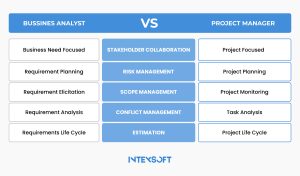
Suppose you are still determining whether your project requires a business analyst or a project manager. We recommend assessing your core needs first. Then, you can choose the right option: business analyst or project manager- or both simultaneously. This choice is a really tricky one, but it is worth making.
Remember, in some companies, it’s common for a business analyst to temporarily replace a project manager. The roles of project managers and business analysts are closely related, and professionals in these positions understand each other’s tasks.
A project manager primarily manages the project’s lifecycle, overseeing deadlines and budgets. In contrast, a business analyst’s role is more centered on gathering and clearly defining requirements from the customers and other stakeholders. This clarity is important to ensure the development team understands the objectives.
Given that a project’s success greatly hinges on correct and precise requirements and ongoing monitoring, embarking on a project without a business analyst is a risky proposition. It significantly elevates the likelihood of failure. Even if a project reaches completion without meticulous requirement management, the final product will not be as robust as it could be. Consequently, competitors with a similar idea might outperform you.
Since the project manager’s role is predominantly managerial, a business analyst with the right soft skills can effectively cover it without compromising the result if the project requires this.
IntexSoft takes pride in our business analysts and project managers, who excel in tasks of any scale and complexity. We understand that you want to – and must – choose the most advantageous solution for your company. We are confident that we have the expertise to address any inquiries or challenges you may encounter promptly. Let’s connect!
The role of a business analyst stands out as one of the most multifaceted and essential. They typically engage in comprehensive project requirement documentation, in-depth data analysis, сlose communication gaps between stakeholders, risk assessment, change management, and project planning. The priority throughout their job is ensuring the project aligns with every business objective.
Indeed, a project manager can assume the role of a business analyst, particularly in smaller projects or when the business faces resource constraints. This decision can enhance communication and reduce role overlap. However, in more extensive and more complex projects, it’s often advantageous to maintain distinct roles. The choice largely hinges on the project’s scale and specific business needs.
The hierarchy between a business analyst and a project manager is not to be fixed. Generally, the project manager has a broader oversight and is responsible for the project’s overall success. But it is not a strict rule. Meanwhile, the business analyst concentrates on requirements and alignment. However, organizational structures and project demands can influence these roles, so there is no one-size-fits-all answer.
Project managers steer the business processes in the right direction, emphasizing timely and cost-effective delivery. Meanwhile, business analysts bridge the gap in stakeholder communication with development teams. Their mission is to facilitate smooth interactions and conduct requirements management successfully.
By leveraging business analyst skills, you can enhance the efficiency and acceleration of your project. Business analysis presents benefits such as: